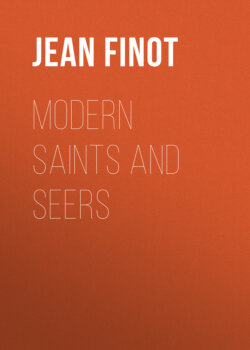Читать книгу Modern Saints and Seers - Jean Finot - Страница 12
На сайте Литреса книга снята с продажи.
THE WHITE-ROBED BELIEVERS
ОглавлениеSometimes this longing for a better world, where suffering would be caused neither by hunger nor by laws, took touching and poetic forms.
About the month of April, 1895, all eyes in the town of Simbirsk were turned upon a sect founded by a peasant named Pistzoff. These poor countryfolk protested against the injustices of the world by robing themselves in white, "like celestial angels."
"We do not live as we should," taught Pistzoff, an aged, white-haired man. "We do not live as our fathers lived. We should act with simplicity, and follow the truth, conquering our bodily passions. The life that we lead now cannot continue long. This world will perish, and from its ruins will arise another, a better world, wherein all will be robed in white, as we are."
The believers lived very frugally. They were strict vegetarians, and ate neither meat nor fish. They did not smoke or drink alcohol, and abstained from tea, milk and eggs. They took only two meals daily—at ten in the morning, and six in the evening. Everything that they wore or used they made with their own hands—boots, hats, underclothing, even stoves and cooking utensils.
The story of Pistzoff's conversion inevitably recalls that of Tolstoi. He was a very rich merchant when, feeling himself inspired by heavenly truth, he called his employés to him and gave them all that he had, including furniture and works of art, retaining nothing but white garments for himself and his family. His wife protested vehemently, especially when Pistzoff forbade her to touch meat, on account of the suffering endured by animals when their lives are taken from them. The old lady did not share his tastes, and firmly upheld a contrary opinion, declaring that animals went gladly to their death! Pistzoff then fetched a fowl, ordered his wife to hold it, and procured a hatchet with which to kill it. While threatening the poor creature he made his wife observe its anguish and terror, and the fowl was saved at the same time as the soul of Madame Pistzoff, who admitted that fowls, at any rate, do not go gladly into the cooking-pot.
The number of Pistzoff's followers increased daily, and the sect of the "White-robed Believers" was formed. Their main tenet being loving-kindness, they lived peacefully and harmed none, while awaiting the supreme moment when "the whole world should become white."
For the rest, the white-robed ones and their prophet followed the doctrines of the molokanes, who drank excessive quantities of milk during Lent—hence their name. This was one of the most flourishing of all the Russian sects. Violently opposed to all ceremonies, they recognised neither religious marriages, churches, priests nor dogmas, claiming that the whole of religion was contained in the Old and New Testaments. Though well-educated, they submitted meekly to a communal authority, chosen from among themselves, and led peaceful and honest working lives. All luxuries, even down to feminine ornaments or dainty toilettes, were banned. They considered war a heathen invention—merely "assassination on a large scale"—and though, when forced into military service, they did their duty as soldiers in peace-time, the moment war was in view it was their custom to throw away their arms and quietly desert. There were no beggars and no poor among them, for all helped one another, the richer setting aside one-tenth of their income for the less fortunate.
Hunted and persecuted by the government, they multiplied nevertheless, and when banished to far-away districts they ended by transforming the waste, uncultivated lands into flourishing gardens.
